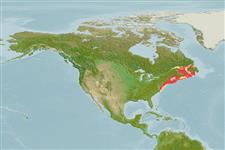Elasmobranchii (tubarões e raias) (sharks and rays) >
Rajiformes (Skates and rays) >
Rajidae (Skates)
Etymology: Leucoraja: Greek, leykos = white + Latin, raja = a fish, Raja sp. (Ref. 45335).
More on author: Mitchill.
Environment: milieu / climate zone / depth range / distribution range
Ecologia
marinhas demersal; oceanódromo (Ref. 51243); intervalo de profundidade 4 - 723 m (Ref. 106604). Temperate; 51°N - 34°N, 79°W - 55°W (Ref. 55278)
Western Atlantic: Newfoundland Banks and southern Gulf of St. Lawrence in Canada to North Carolina, USA.
Comprimento de primeira maturação / Tamanho / Peso / Idade
Maturity: Lm 74.5, range 73 - 76 cm
Max length : 113 cm TL macho/indeterminado; (Ref. 106604); idade máx. registrada: 21 anos (Ref. 52109)
Descrição suscinta
Morfologia | Morfometria
Disk rounded, with many small dark spots on upper surface. Usually 1-4 ocelli on upper surface on each side of disk, each with a dark brownish center and pale edge. Young have long middorsal row of large spines on disk and tail. Upper jaw has 72 rows of teeth (Ref. 7251). Lower surface usually white but marked with irregular pale brownish blotches (Ref. 6902).
Prefer sandy and gravelly bottoms in shoal water in the north range; to at least 90 m in south (Ref. 7251). Benthic (Ref. 5951). Those caught at Cans, Nova Scotia in Canada were found to have eaten dollarfish, cunner, and squid. Mostly inactive during daylight hours, but active under dark conditions (Ref. 10807). Oviparous. Distinct pairing with embrace. Young may tend to follow large objects, such as their mother (Ref. 205). Eggs are oblong capsules with stiff pointed horns at the corners deposited in sandy or muddy flats (Ref. 205). Egg capsules are 5.5-9.9 cm long and 3.5-5.3 cm wide (Ref. 41249, 7135, 71301).
Electric organ discharge (EOD) activity seemed more frequent during dark periods (Ref. 10808). The individual EOD of this species is monophasic, head-negative, and lasts 217 ms (Ref. 10011). This species is used only for the manufacture of fish meal.
Ciclo de vida ou comportamento de acasalamento
Maturidade | Reprodução | Desova | Ovos | Fecundidade | Larvas
Oviparous, paired eggs are laid. Embryos feed solely on yolk (Ref. 50449). Distinct pairing with embrace. Young may tend to follow large objects, such as their mother (Ref. 205).
McEachran, J.D. and K.A. Dunn, 1998. Phylogenetic analysis of skates, a morphologically conservative clade of elasmobranchs (Chondrichthyes: Rajidae). Copeia 1998(2):271-290. (Ref. 27314)
Status na Lista Vermelha da UICN (Ref. 130435)
Ameaça para os humanos
Harmless
Uso pelos humanos
Mais informação
ReferênciasAquaculturaPerfil para aquaculturaEstirpesGenéticaElectrophoresesHereditariedadeDoençasProcessamentoNutrientsConversão de massa
Ferramentas
Relatórios especiais
Baixar XML
Fontes da internet
Estimates based on models
Preferred temperature (Ref.
123201): 1.5 - 14.4, mean 7.9 °C (based on 130 cells).
Índice de diversidade filogenética (Ref.
82804): PD
50 = 0.5000 [Uniqueness, from 0.5 = low to 2.0 = high].
Bayesian length-weight: a=0.00263 (0.00232 - 0.00298), b=3.23 (3.20 - 3.26), in cm total length, based on LWR estimates for this species (Ref.
93245).
Nível Trófico (Ref.
69278): 4.4 ±0.5 se; based on diet studies.
Resiliência (Ref.
120179): Muito baixo(a), tempo mínimo de duplicação da população maior que 14 anos (tmax=20.8; tm=11-12; Fec assumed to be <100).
Fishing Vulnerability (Ref.
59153): High vulnerability (59 of 100).
Nutrients (Ref.
124155): Calcium = 10.8 [2.1, 52.6] mg/100g; Iron = 0.305 [0.081, 0.865] mg/100g; Protein = 17.6 [14.8, 20.3] %; Omega3 = 0.877 [0.282, 3.251] g/100g; Selenium = 10.7 [2.7, 33.9] μg/100g; VitaminA = 13.1 [4.1, 41.9] μg/100g; Zinc = 0.315 [0.151, 0.571] mg/100g (wet weight);
